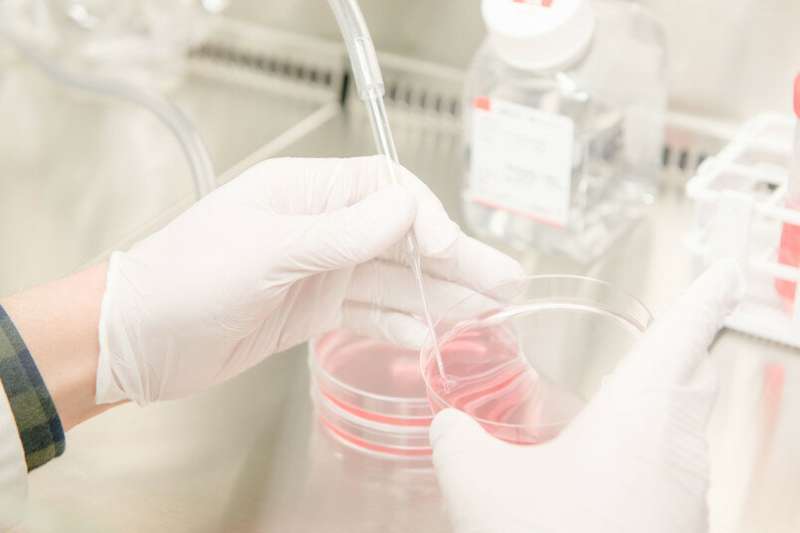The researchers have investigated how Bevacizumab acts directly on nerve cells. Credit: RUB, Marquard
Glioblastoma is the most common kind of brain tumour in adults. It is a very aggressive form of cancer; patients with this diagnosis have a median post-diagnosis survival of 15 months. Especially in the US, the drug Bevacizumab is used to treat glioblastomas. The drug is not chemotherapy in the classical sense, but involves therapy with an antibody that is designed to stop cancer growth. Evidence from a large-scale therapy study indicates that glioblastoma patients treated with Bevacizumab may develop cognitive impairment. A team of scientists from the Ruhr-Universität Bochum (RUB) therefore investigated how Bevacizumab affects brain cells. The researchers describe their results in the journal Frontiers in Cellular Neuroscience published online on 26 March 2019.
Is the hippocampus affected?
Glioblastomas can only grow so fast because they form a dense network of blood vessels. For this purpose, the tumour cells produce large amounts of the growth factor VEGF. Bevacizumab binds and blocks this growth factor, preventing new blood vessels from forming. However, the growth factor VEGF does not only affect the formation of new blood vessels, it also has a stimulating and protective effect in the central nervous system.
Neuroscientists from the Department of Cytology, the Department of Neurophysiology, and the Department of Neurology at the RUB university clinic Knappschaftskrankenhaus examined cognitive impairments reported in glioblastoma patients treated with Bevacizumab are due to functional changes in the hippocampus – the main memory structure of the brain.
Abnormalities in the hippocampus discovered
Using brain slices and neuronal cultures from rats, they investigated the effects Bevacizumab has on hippocampal cells. They focused on three aspects: the neuronal plasticity of the cells, the spines on the nerve cells, and the cells firing properties. All three components are important factors for cognition and memory formation. Abnormalities were found in all aspects.
"In our study, we showed for the first time that Bevacizumab can influence the function of the hippocampus," says Professor Denise Manahan-Vaughan, Head of the Department of Neurophysiology at RUB. "This may explain cognitive effects of this medication". Whether the Bevacizumab concentration selected in the experiments corresponds exactly to that achieved in the human brain of a glioblastoma patient undergoing therapy with Bevacizumab, is currently unclear, however.
More information: Pauline Latzer et al. Blocking VEGF by Bevacizumab Compromises Electrophysiological and Morphological Properties of Hippocampal Neurons, Frontiers in Cellular Neuroscience (2019). DOI: 10.3389/fncel.2019.00113
Journal information: Neuroscience
Provided by Ruhr-Universitaet-Bochum





















